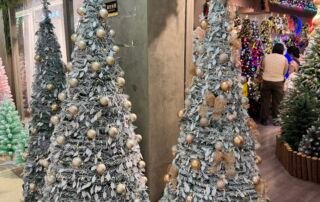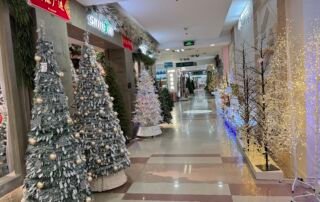Yiwu Hats & Caps Market – The Ultimate Guide 2025
A little about me – Kevin: I’m a sourcing agent who has spent more than 15 years on the ground here in the Yiwu hat market. I’ve helped global brands source millions of hats and caps, and I’ve learned a thing or two about navigating the market, ensuring quality, and getting products shipped without a hitch. I’m here to share what I know with you.
Let’s Talk About Yiwu
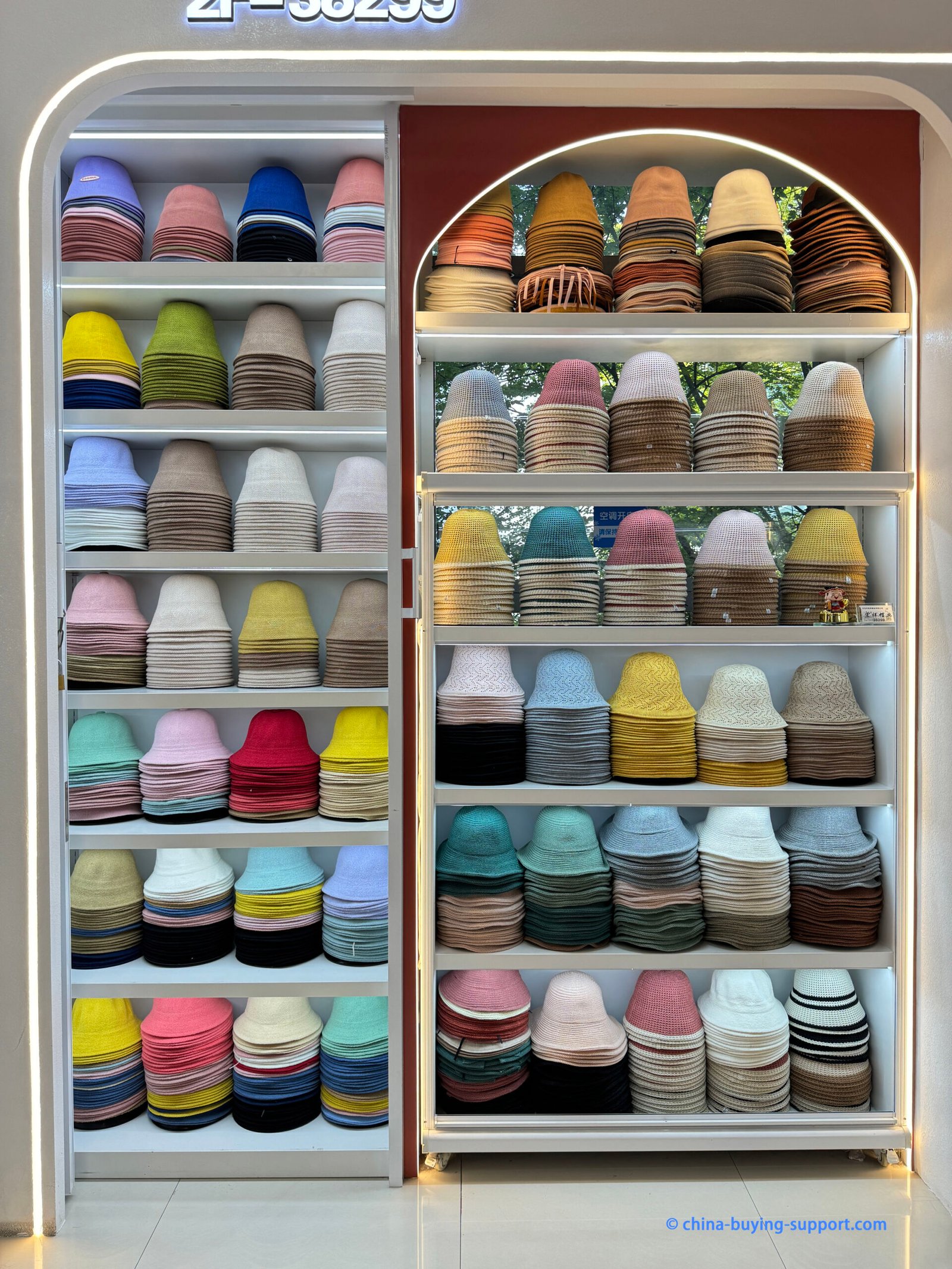
Close view of a factory sample showroom featuring LED-lit, floor-to-ceiling shelving. Hats are neatly arranged and color-sorted—pastels (mint, pink, lilac), brights (yellow, red, teal), and neutrals (beige, gray, brown, black). Materials include woven straw-style, ribbed knit, and cotton with striped bands. An arched light box highlights the right display bay. The layout and polished-tile flooring signal a showroom-style, factory-direct operation with consistent sizing and ample inventory for bulk, OEM/ODM, and private-label buyers.
If you’re an overseas buyer looking for sourcing hats and caps from China, you can’t ignore Yiwu. Yiwu is home to a massive hats and caps market that serves as a one-stop sourcing hub for buyers from around the world. Located within the sprawling Yiwu International Trade City, the Yiwu hats and caps wholesale market boasts over 1,000 suppliers under one roof, spanning nearly 20,000 square meters of booth space, with hat exports surpassing RMB 4 billion (around 600 million USD) in 2024, you can check below chart of the top export destination countries from Yiwu Hat Market. You’ll find everything from summer straw hats to winter beanies here – all at very competitive prices. This comprehensive guide will walk you through why Yiwu is the go-to place for hats and caps, what products you can find, how to navigate the market, and essential tips to make your buying trip a success.
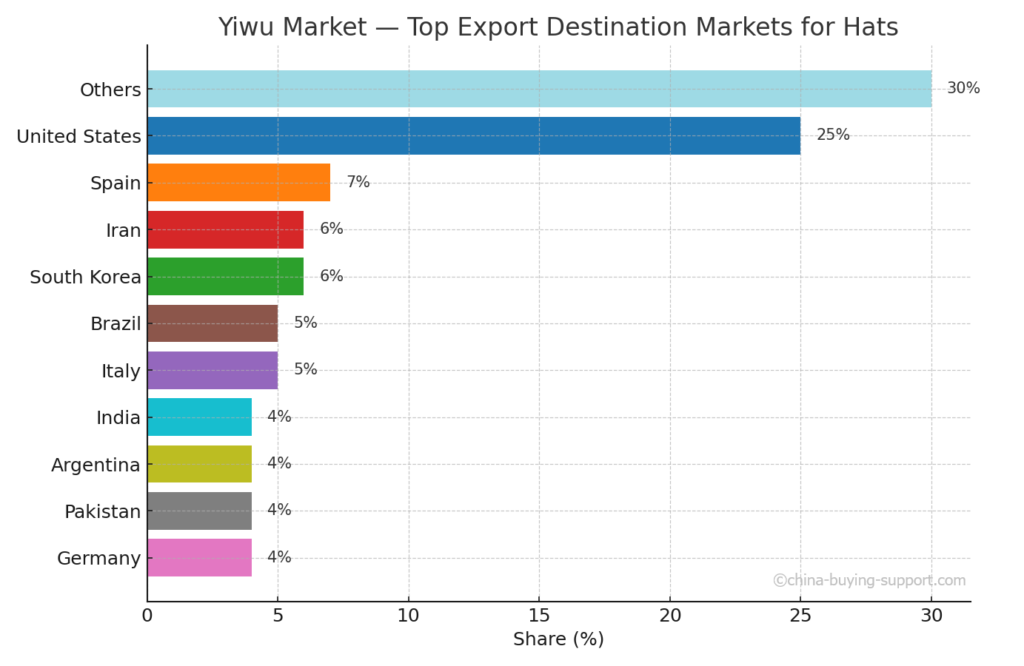
Discover Yiwu Market’s top hat export destinations: USA leads with 25%, followed by Spain (7%), Iran & South Korea (6% each). Complete breakdown of global hat trade markets from China’s largest wholesale hub.
So, Why Yiwu Is the Best Place for Hats & Caps?
China’s big hat factories are scattered all over the country—in places like Shandong (Qingdao), Zhejiang (Ningbo, Taizhou, Yiwu), Guangdong (Dongguan) and Fujian (Quanzhou and Jinjiang). What makes Yiwu so special is that it pulls all of that manufacturing power into one single, convenient place. It’s the ultimate one-stop place – Yiwu Market.
Instead of spending weeks (and a small fortune) flying between different cities, you can see a mind-boggling variety of styles in just one trip. It’s right here, Yiwu Hat Market!
Here’s a quick look at what makes Yiwu tick:
- 1,000+ Showrooms: An incredible range of products from all over China.
- 240+ Local Factories: A solid local manufacturing base that pumps out over $620 million in hats each year.
- Open All Year: This isn’t a seasonal fair; it’s a permanent exhibition that’s open for business every day.
As a friend in this business always says, “You save weeks of travel and thousands in expenses. Instead of flying to Qingdao, then to Guangzhou, you make one trip. For hats, Yiwu is the place.”
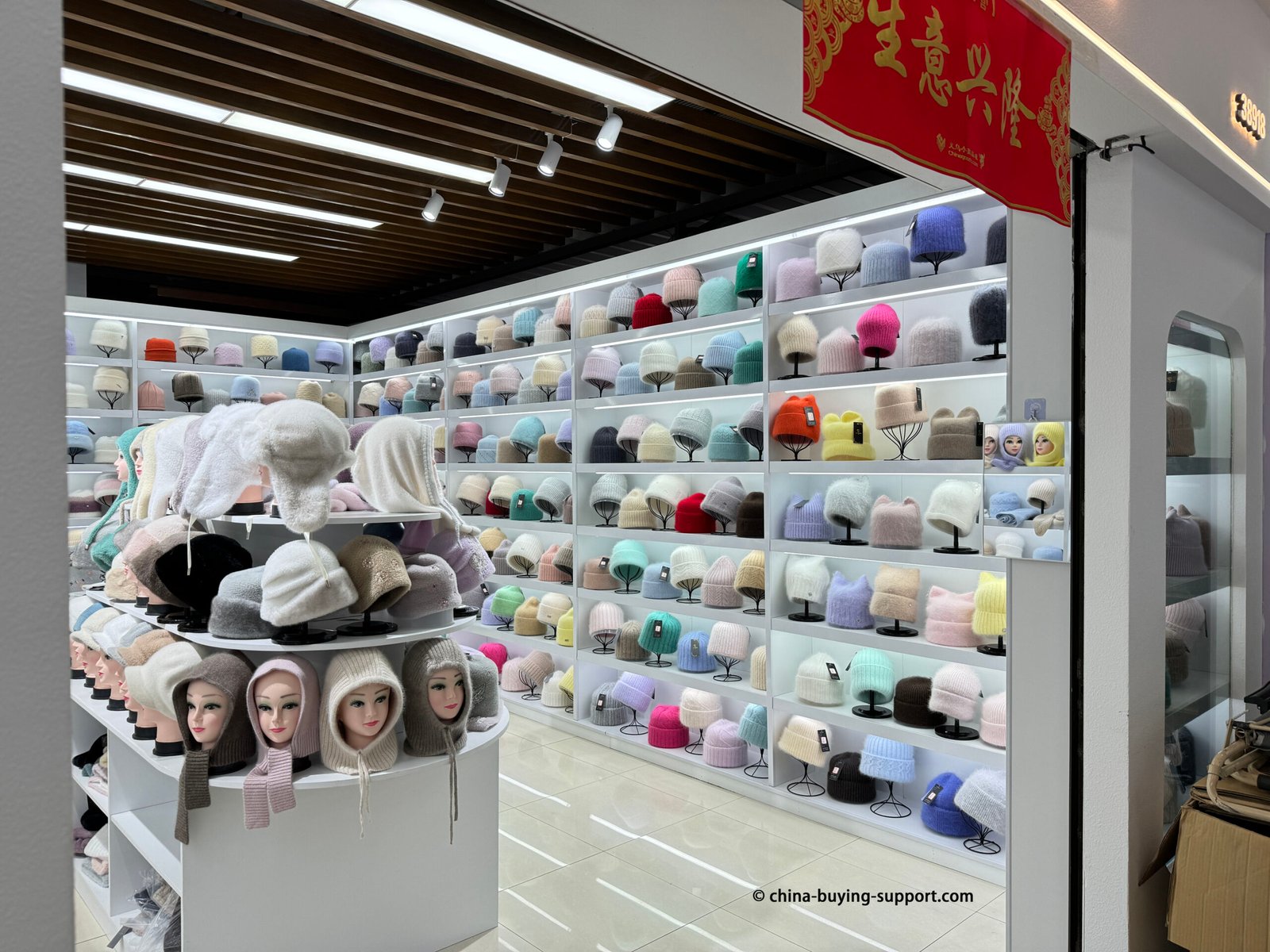
A high-resolution retail display inside the Yiwu International Trade City hat market shows multiple rows of winter beanies arranged on white, back-lit shelving. The assortment includes ribbed knit caps, cable-knit styles, and fluffy mohair/angora-style beanies, plus playful cat-ear designs. Colors range from soft pastels (mint, baby blue, lavender, blush, cream) to brights (hot pink, neon yellow, orange) and classic neutrals (beige, white, gray, brown, black). Many hats feature small woven labels or hang tags. Each piece sits on a matte-black wire mannequin stand; the space is evenly lit with glossy tile flooring, conveying a clean, organized wholesale presentation typical of Yiwu’s market
* You can check more High-Resolution Images about Yiwu Hats and Caps Market by reading this article <58 Real Photos Take You Inside Yiwu Hats and Caps Wholesale Market – The Best Wholesale Market for Hats in China>, or click here. These images will give you a more comprehensive and intuitive understanding of this market.
What Kinds of Hats & Caps Can You Actually Find in Yiwu Market?
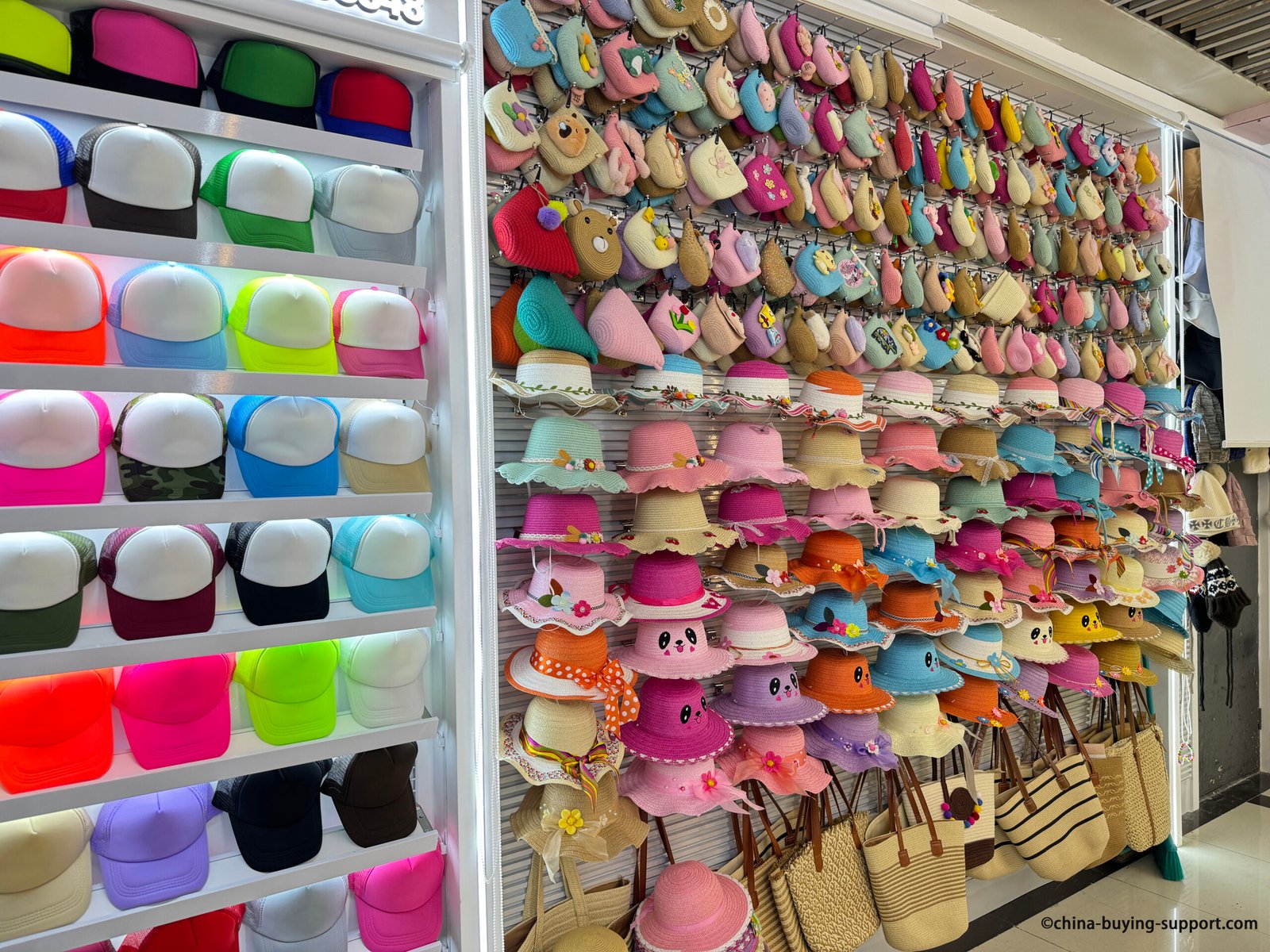
Kawaii children’s accessories: knitted coin purses (bear, rabbit motifs) and ruffled sun hats neatly arranged on a slat-wall in Yiwu Market’s hat area
The sheer variety here is what blows most first-time visitors away. If you can dream up a hat style, you can probably find it. And if you can’t, someone here can almost certainly make it for you.
Here are the main categories you’ll see everywhere:
- Fashion Hats & Caps: Trendy designs for all genders, including wholesale snapbacks, bulk dad hats, stylish fedoras, custom bucket hats, and more. Showrooms are constantly updated with the latest trends, featuring caps with custom logos, prints, and embroidery.
- Seasonal Hats: Everything you need to build a year-round collection. Find wide-brimmed straw hats and sun visors for summer, alongside knitted beanies, wool hats, and earflap caps for winter. No matter the season, Yiwu suppliers have you covered with appropriate headwear.
- Kids’ and Novelty Hats: An entire range of children’s hats and fun novelty caps. You’ll find cute cartoon character hats, animal-themed plush hats, party hats, and even costume pieces like clown hats and holiday-themed headwear. These are great for events, promotions, or kid-focused businesses.
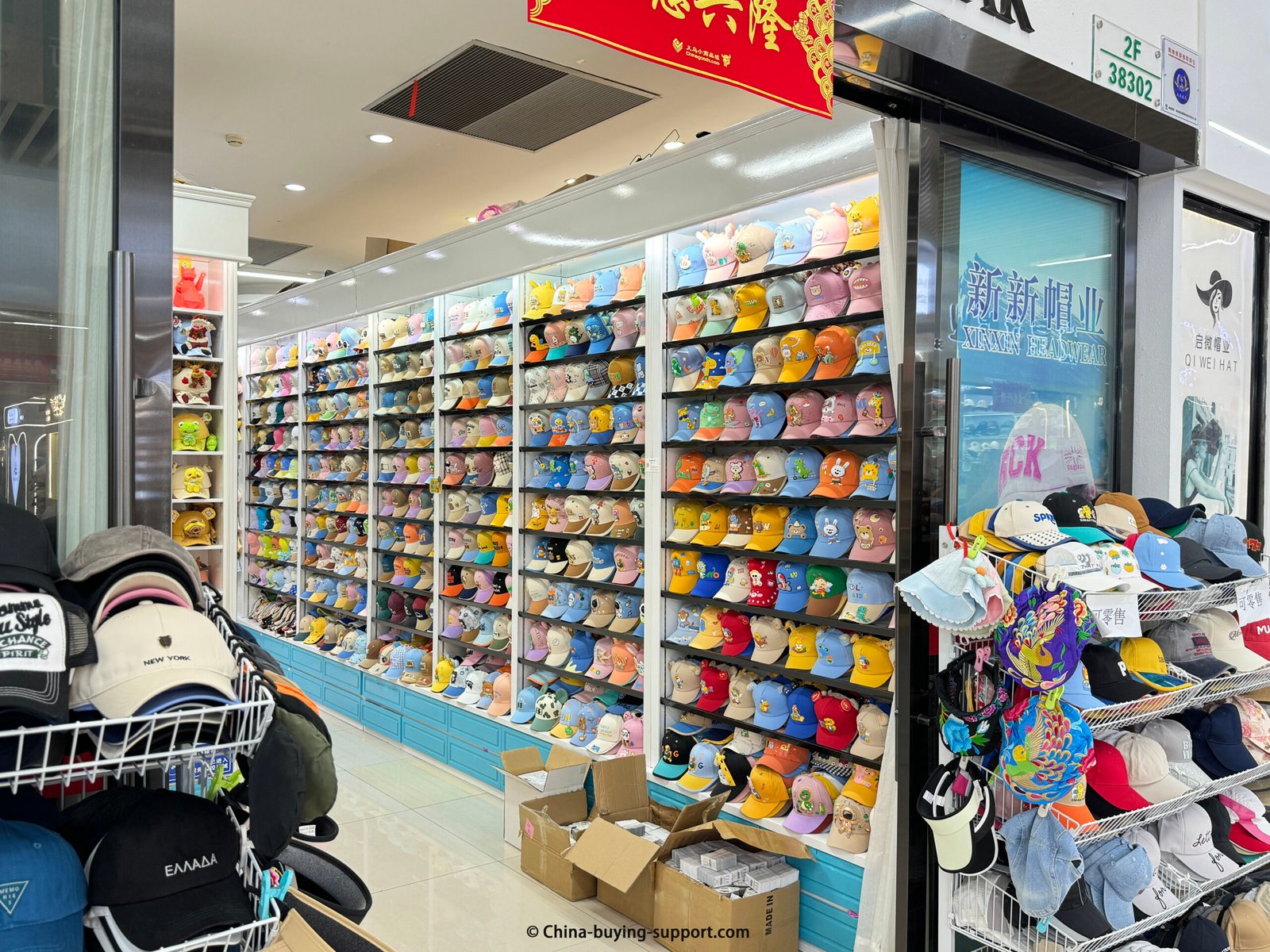
Inside Yiwu International Trade City (Yiwu Market), Zhejiang, China, the Xinxin Hatwear (新新帽业) storefront displays floor-to-ceiling racks of children’s hats—pastel and bright cartoon baseball caps with embroidered animals (bears, ducks, dinos, bunnies), some with 3D ears, alongside sun visors, bucket hats, and summer caps.
- Sports and Team Caps: Athletic caps such as baseball caps, trucker hats, golf visors, and team logo hats. Yiwu has many cap suppliers that specialize in sports caps and can even customize caps with your team or brand logo (great for promotional use).
- Promotional & Custom Hats: Simple, budget-friendly caps often used for advertising, giveaways, or corporate branding. These promotional hats and caps come in many colors and styles and are designed for low cost at high volume. Many Yiwu hat suppliers can also create custom designs or put your logo on hats with low wholesale pricing.
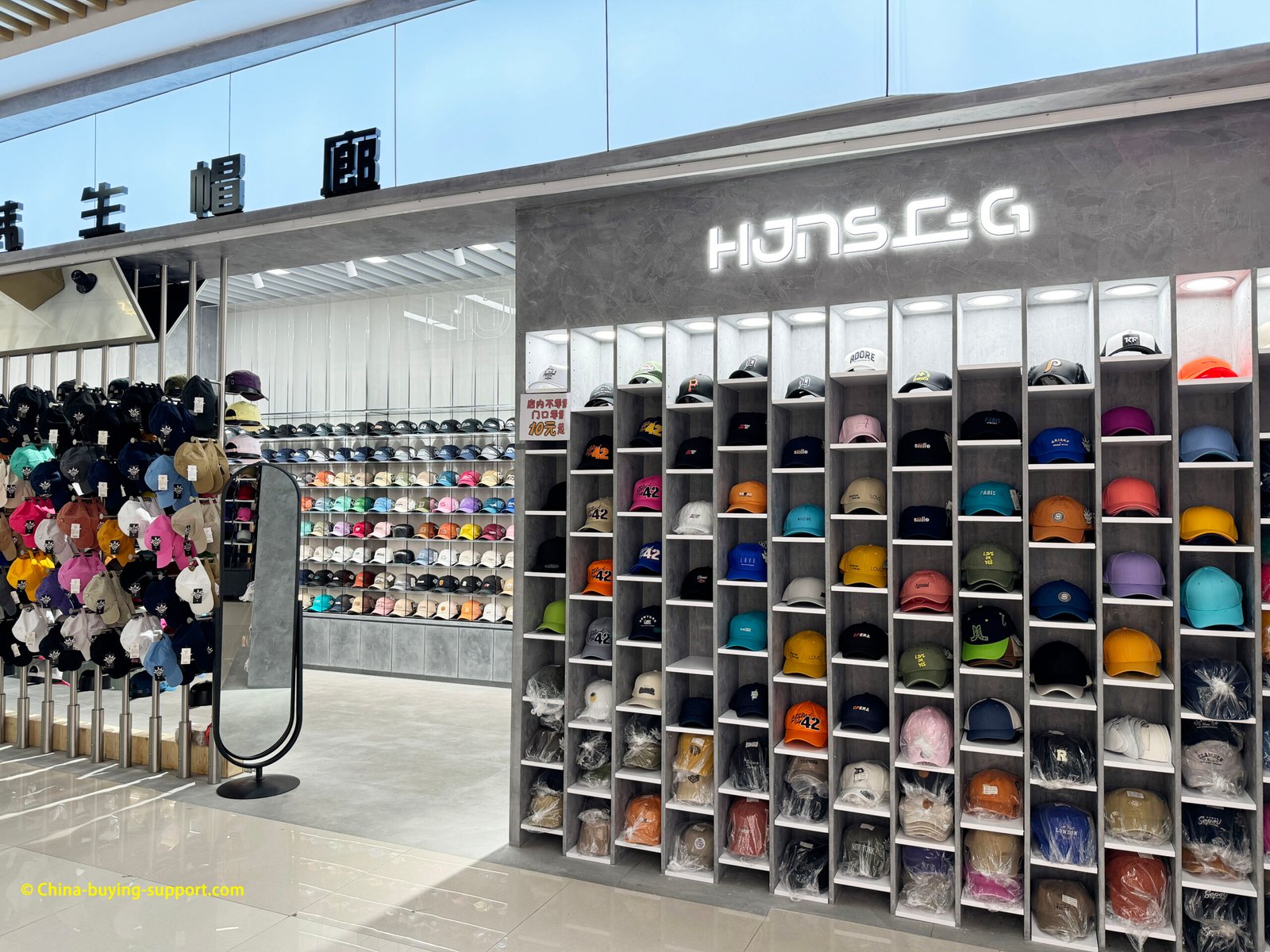
This image shows the sample room of a cap manufacturer. On the right, a tall wall of gray cubby shelves is filled with multicolor baseball caps—black, navy, beige, khaki, orange, yellow, teal, purple, and pink. Styles include curved-brim dad hats, structured snapbacks, mesh trucker caps, and 5-/6-panel strapback designs with metal buckle or plastic snap closures. Many fronts feature minimalist embroidery, letters, or numbers; bagged inventory appears on the lower shelves, indicating bulk stock.
A Quick Word on Hat Customization
The sheer variety in Yiwu’s hat market is hard to overstate – you can source everything from basic cotton baseball caps to elaborate fashion hats with feathers. Traditional styles (like newsboy caps, cowboy hats, or berets) sit alongside quirky items (like LED light-up caps or mascot headwear). If an item isn’t readily found on the shelf, most suppliers are willing to modify existing designs or produce new styles based on your requirements. In other words, global buyers can easily develop a full seasonal collection by picking and choosing from Yiwu’s vast selection and even requesting custom tweaks. And thanks to intense competition in the market, prices are generally very affordable across the board. For example, simple hats might cost as little as RMB 4.5–5.5 each (about $0.65–$0.77 USD) when bought in bulk. Even higher-end caps (with special materials or premium branding) top out around $10–$15 at wholesale. This means you can source both low-cost promotional caps and better-quality fashion hats from the same market, giving you flexibility depending on your target market and budget.
Let’s just break down a 3D embroidery logo on cap step-by-step processes as an example. So you can have a general idea about hat customization here:
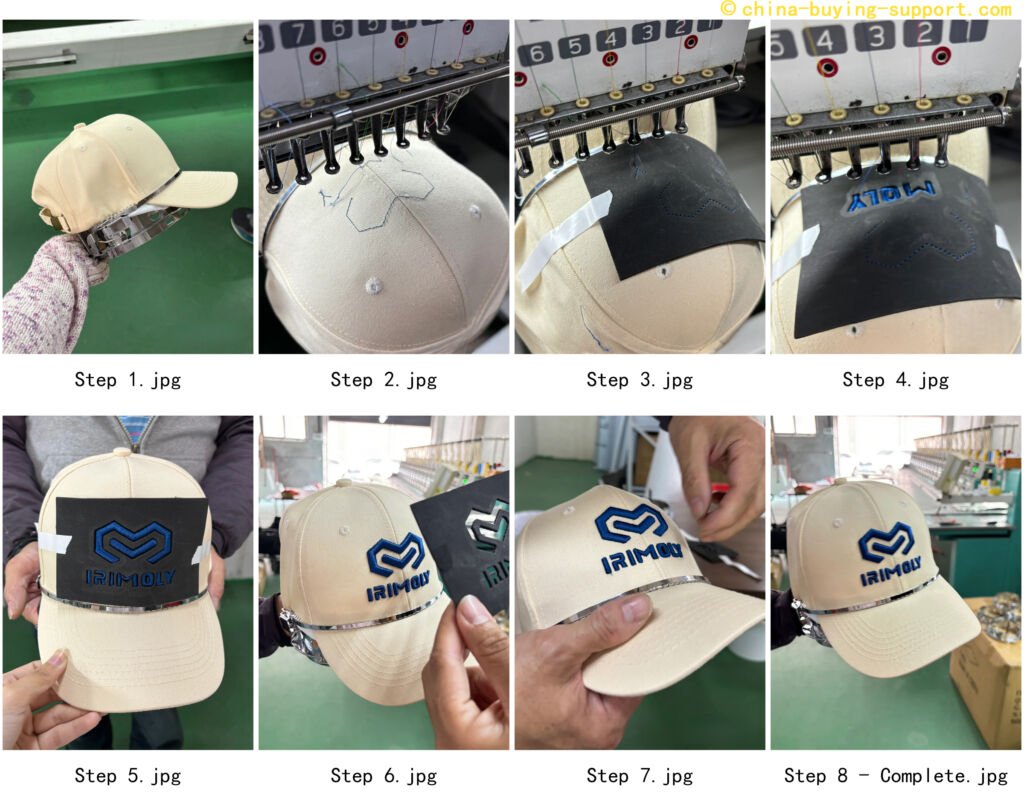
This image illustrates the step-by-step process of creating a striking 3D puff embroidered logo on a baseball cap. Starting from the initial hooping and stitching of a placement outline, the image progresses through the application of specialized 3D foam, the precise embroidery of the logo with a high-density satin stitch, the careful removal (weeding) of excess foam, and finally showcases the finished, raised logo. This visual guide highlights the detailed craftsmanship involved in achieving a premium, 3D embroidered effect.
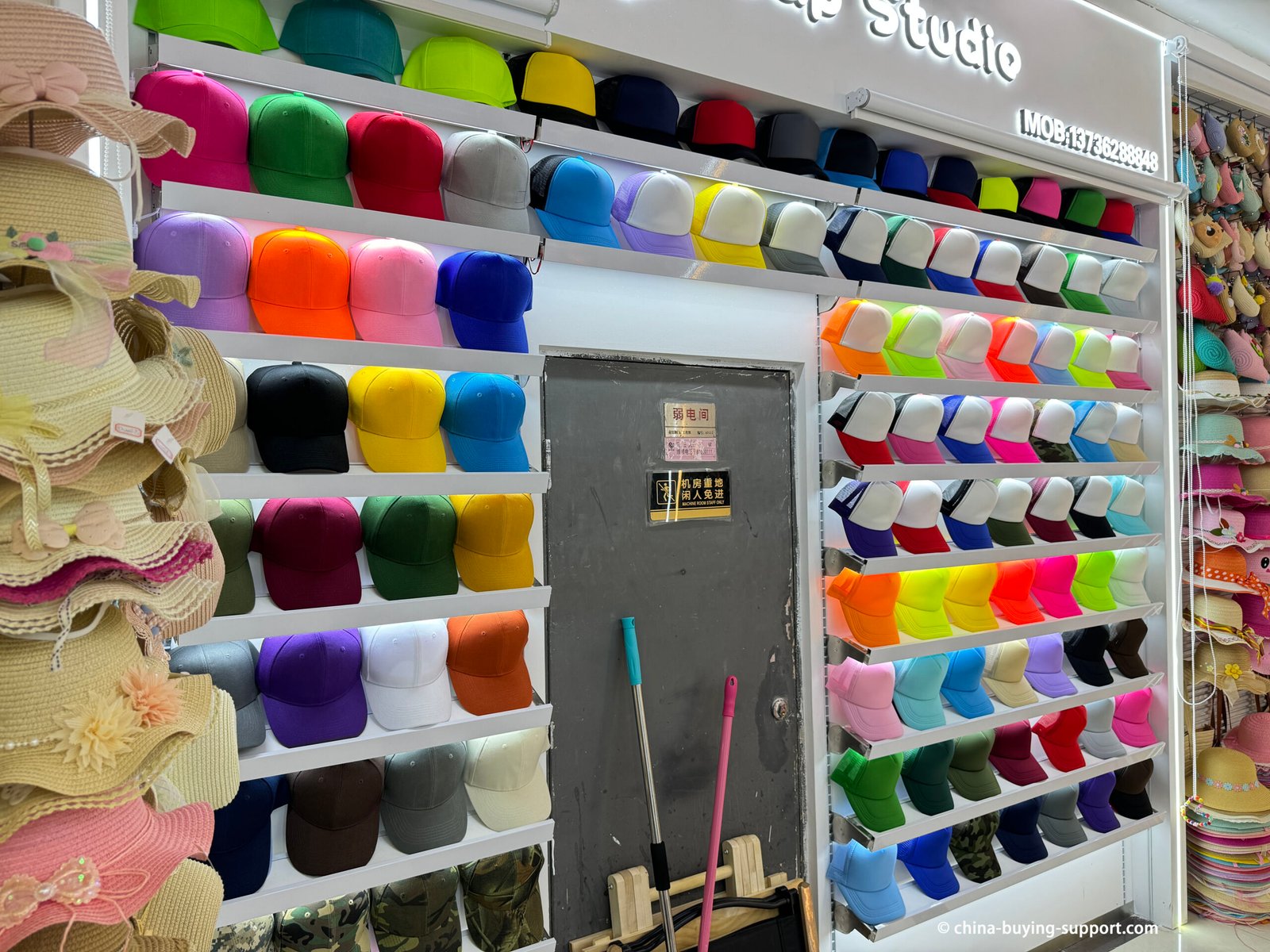
a Yiwu hat wholesaler showing a color wall of blank baseball caps and neon trucker hats—solid twill, mesh backs, and camo options—ideal for custom branding
Step #1. Hooping the Cap
We mount the cap on a cap driver + cap frame. The metal ring locks the bill and crown so the fabric stays flat across the center seam. We align the seam with the machine’s center mark to keep the logo perfectly straight.
Step #2. Placement Check
Before any real stitching, we run a quick trace/placement stitch on the crown. This light outline confirms size and position so the design won’t drift over the seam or hit the visor.
Step #3. Preparing for 3D Puff Embroidery
For the raised logo, we place a piece of puff foam (2–3 mm EVA) over the placement outline and tape the edges. The foam is what gives 3D puff its height.
Step #4. Perforation / Tack-down
We run a short perforation/tack sequence. Tiny stitches punch through the foam and hold it in place exactly where the columns will stitch, preventing shift and blow-outs.
Step #5. Stitching the Logo
Now the fun part: dense satin columns* build the 3D structure. We set proper column width, density, and capping stitches so the thread wraps the foam cleanly and “pops.” Needle height and thread tension are tuned for caps to glide over the center seam without thread breaks. You can see the logo taking shape here.
* What is Satin Column?
A satin column is a fundamental embroidery stitch used to fill narrow shapes like lettering and outlines. It’s created by a series of long stitches that run parallel to each other, passing from one edge of the shape to the other in a tight, zigzag motion. The uniform direction of these long stitches gives satin columns their signature characteristic: a bright, glossy sheen and crisp, well-defined edges, resulting in a slightly elevated, three-dimensional feel.
This is distinctly different from a Tatami or Fill Stitch, which uses shorter, interlocking stitches to cover wider areas, producing a flatter, more textured surface with less reflection. In short, satin columns are ideal for creating bold, lustrous details, while tatami fills are used for covering large surface areas.
Step #6. Foam Removal
Once stitching finishes, we peel away the excess foam by hand. The perforations tear clean.
Step #7. Cleanup and An Eye for Detail (QC)
A machine can do the heavy lifting, but the final touches require a skilled hand. Quality-control inspects every single piece, carefully cleaning up any stray threads and removing tiny bits of remaining foam.
Step #8. Final Quality Check
De-hoop, brush the nap, trim jump threads, and inspect alignment and edge seal. Result: a structured cap with a sharp, durable logo and a bold 3D puff embroidery finish. This meticulous finishing process is what separates a good-looking cap from a great one.
Let’s Talk Money: Understanding Price vs. Quality
| Hat Category | Yiwu Hat Market Typical Wholesale Price Range (USD) | What You’re Paying For (The Details) in Yiwu Hat Market |
|---|---|---|
| Promotional/Basic | $0.65 – $2.00 | Lighter fabric (like 108×58 cotton twill), a basic plastic buckle, and single-row stitching on the sweatband. |
| Fashion/Retail | $2.00 – $5.00 | Better fabrics, cool 3D embroidery, custom patches or labels, and nice taping on the inside seams. |
| Complex/Premium | $5.00 – $7.50+ | Special materials like wool or raffia straw, more complicated designs, and high-end branded hardware. |
Where the Yiwu Hat Market Is and How to Navigate It
The hats & caps wholesale market is located in 2nd floor, District 4 of the Yiwu International Trade City (Yiwu Futian Market), which is a gigantic wholesale complex divided into districts. Specifically, the hat and cap vendors occupy the 2nd floor, between Street 18 and Street 30 (see below the real photo of Street #18 to Street #30) inside District 4. If you’re coming through the building entrances, this area corresponds to Gate 84 through Gate 92 (see below photo – Gate 92 of Yiwu Market) on the second floor. In practical terms, once you reach District 4, 2F, follow the aisle numbers or ask for the hat section – locals will point you in the right direction. You will know you’re there when you start seeing rows of booths overflowing with hats of every shape and color!
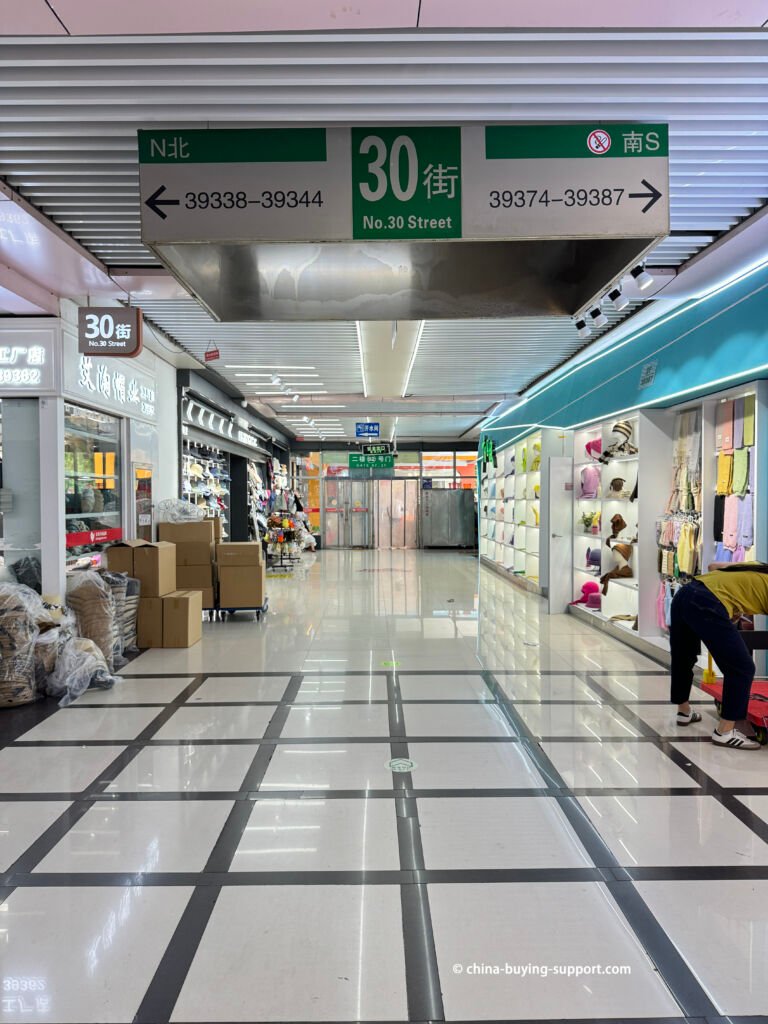
Aisle view at the hats area of Yiwu International Trade City (义乌国际商贸城), the end of No. 30 Street near Gate 92.
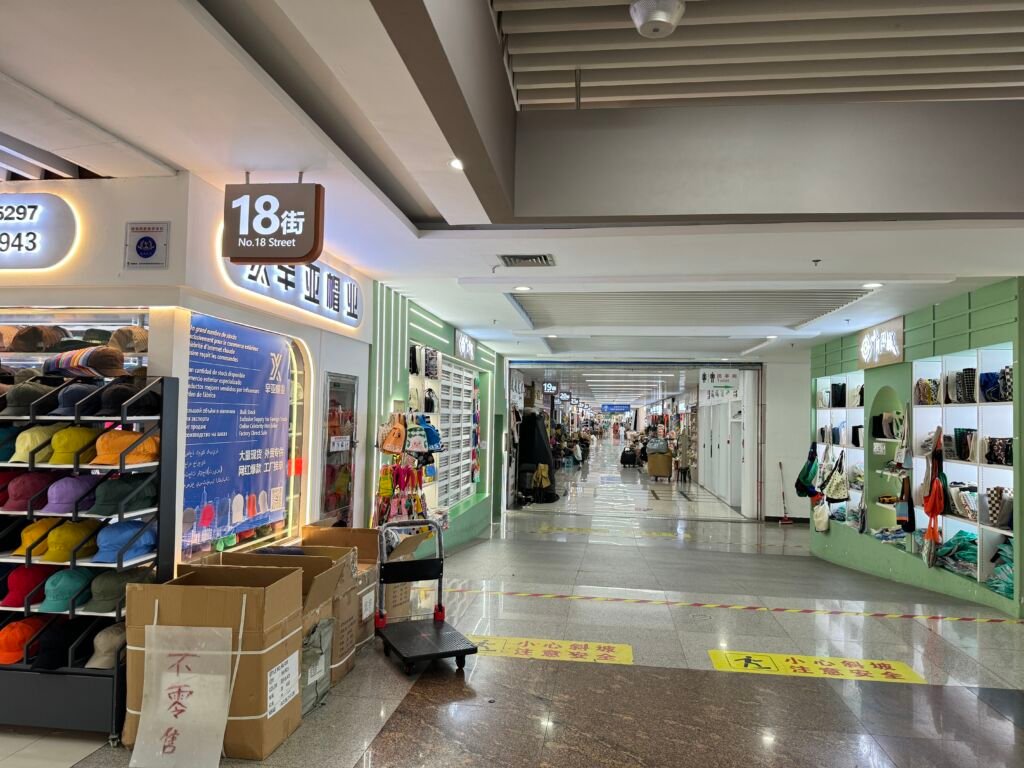
In District 4 of Yiwu International Trade City, the hats section spans Streets 18–30, with rows of wholesalers offering caps, beanies, and fashion hats. Overhead signs mark each aisle, making it easy for first-time buyers to navigate and plan sourcing.
The market’s operating hours are roughly 09:00 to 17:00 (9am to 5pm), and it’s open all year round except for a shutdown during the Chinese Spring Festival (Chinese New Year Holidays, around late January or February). It’s wise to plan your visit outside of the Chinese New Year period, as 100% of vendors will be away on holiday then.
The Golden Rule: Plan Around Chinese New Year (CNY) This is the single most important timeline consideration of the year. Chinese New Year is not a simple week-long holiday; it causes a near-total shutdown of China’s manufacturing sector for 2-4 weeks, typically between late January and late February.
The Problem: This is more than just a production shutdown; it’s a full-blown supply chain disruption. In the weeks leading up to the holiday, factories rush to finish orders, which can often lead to a decline in quality control. Simultaneously, a massive pre-holiday rush to export goods creates intense competition for container space and logistics services. As a direct result, both sea and air freight rates can rise sharply, sometimes increasing dramatically as companies are willing to pay a premium to get their products out before the country closes down. This situation often leads to production delays, quality control failures, and severely inflated shipping costs.
The Solution: To avoid this chaos, your purchase order must be confirmed, and your 30% deposit paid, no later than early December. This gives the factory enough time to procure all needed raw materials before their own suppliers begin to close for the holiday. Any orders placed after this cut-off are at high risk of being delayed until mid-March or even April.
Navigating inside Yiwu Market can be a challenge for first-timers because there are over 1,000 showrooms spread across multiple aisles (see below the photo taken inside yiwu hat market, you can see how long the aisles is). The layout is somewhat grid-like, with numbered streets and booth numbers. To avoid getting lost or missing any vendors, a pro tip is to walk the market in an “S” shaped route. Trust me on this. To make sure you see everything without getting lost, start at one end and snake your way up and down each aisle. It’s a simple trick that saves a ton of time and confusion. You can also grab a floor map at the information desk or use the Yiwu market app/website to see the layout.
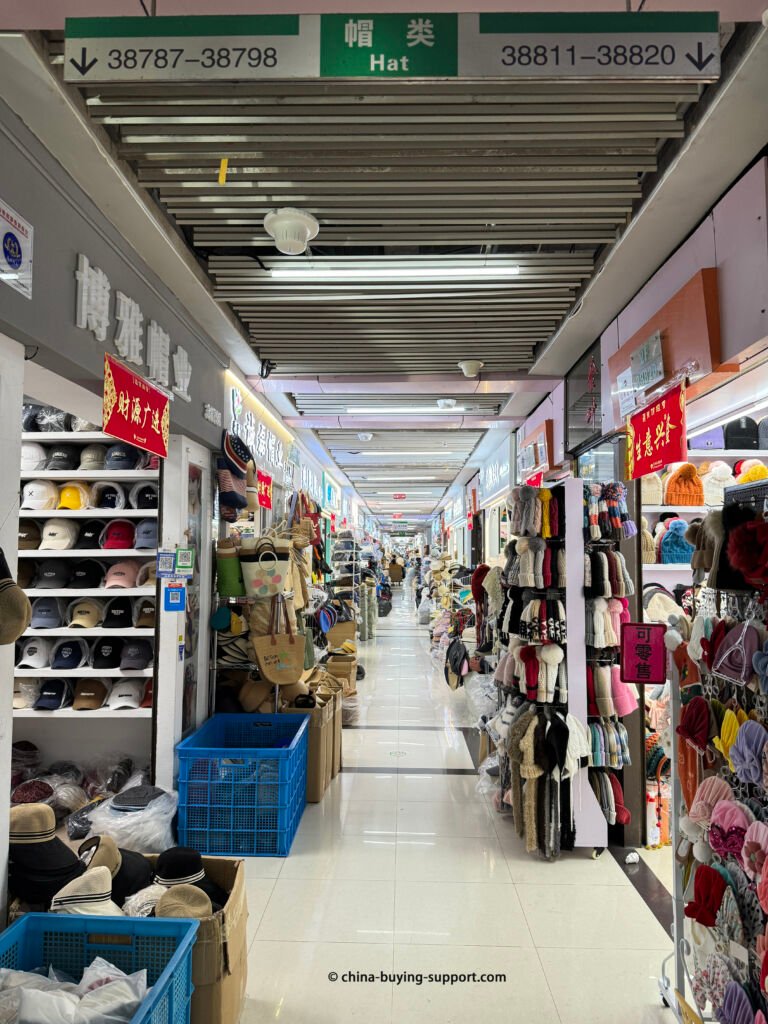
Long indoor aisle at Yiwu International Trade City (Futian Market), Zhejiang, China—wholesale hat vendors display bucket hats, caps, straw hats and knit beanies on both sides.
As you explore, take notes and collect business cards from stalls of interest. It’s easy to be overwhelmed by the volume of products, so keeping a list of the best finds (with their booth numbers) will save you headaches later. Many buyers snap quick photos of the product and the shop’s sign or card – this way you remember which supplier had the hat you liked. Don’t worry about seeing the same hat in multiple shops (that’s common, as we’ll discuss later); instead, focus on evaluating quality and pricing as you make your way through the aisles.
Communication in the market is generally not too difficult. A number of sellers speak basic English, and almost all are used to dealing with foreign customers. Simple gestures and a calculator (for showing prices) go a long way. Still, if you are not comfortable negotiating in Chinese and plan to place significant orders, consider hiring a local Yiwu agent or translator to accompany you – they can help with bargaining, record-keeping, and later orders and shipping follow-ups. The market experience can be intense, but with a plan and a good pair of walking shoes, you’ll find it both exciting and efficient to walk around.
| Location Element | Details of Yiwu Hat Market | Kevin’s Tip |
|---|---|---|
| Market Complex | Yiwu International Trade City (also called Yiwu Futian Market) | This place is enormous. Seriously, wear comfortable shoes. Plan to be here all day. |
| District | District 4 (四区) | This is the hub for all things textiles and clothing. |
| Floor | 2nd Floor (2F / 二楼) | This entire floor is dedicated to headwear. You can’t miss it. |
| Specific Area | East Section, between Streets 18-30 | This lines up with Gate 84 through Gate 92. If you get lost, just ask for the “帽子区” (màozi qū). |
| Operating Hours | 09:00 – 17:00 (Every Day) | The big exception is Chinese New Year Holidays (usually late Jan/Feb) when everything shuts down. Avoid it! |
MOQ, Lead Time, and Pricing in Yiwu Hat Market
- Minimum Order Quantity (MOQ) in Yiwu Hat Market: Most hat suppliers in Yiwu require a minimum order of about 120–360 pieces per design per color. This means, for example, you might need to order 360 hats of a given style and color. If a hat comes in multiple colors, many vendors will allow you to split the MOQ across a few colors (e.g. 120 per color, totaling 360). The good news is that many suppliers keep some stock on hand for popular items. If they have existing inventory, they may sell smaller quantities or even let you buy by pack (1 pack = 12 pieces) with no strict MOQ. It’s also sometimes possible to negotiate lower quantities (60, 120, 180 pieces) for a new design if you agree to a higher unit price to offset the small run. Overall, the Yiwu market is relatively friendly to small and medium buyers compared to factory-direct purchasing – there’s some flexibility, especially if you find a trading company showroom that consolidates products from multiple factories.
- Production Lead Time in Yiwu Hat Market: For hats and caps that are made-to-order or not in stock, the typical production lead time is around 2–4 weeks after you place the order. This can vary depending on the factory’s workload and the complexity of the design, but about one month is a good rule of thumb for most standard orders. If you’re buying items that the supplier already has in inventory, then the lead time is basically just packing and delivery – potentially just a few days to arrange shipping. Keep in mind that lead times can be longer before major holidays (e.g. before Chinese New Year many factories rush to finish orders, and then close for 1-3 weeks). Always confirm the delivery timeframe with the supplier and make sure it’s written on your order contract or PI (Proforma Invoice). Reliable suppliers will deliver as promised, but it’s wise to pad your schedule a bit in case of any delays in production or freight.
- Pricing in Yiwu Hat Market: One of the biggest advantages of the Yiwu hat market is pricing. Thanks to huge competition and the wholesale nature of the market, you can find hats at almost any target price point. Basic caps and simple hats can cost well under $1 USD each at wholesale for bulk orders. In Yiwu, there’s a saying that you can “meet almost any target price”– if you have a price in mind, someone likely can make a product to fit that budget. However, price and quality go hand-in-hand. As a famous Chinese proverb says, “one cent in price, one cent in quality” (一分价钱一分货) meaning you get what you pay for, good things don’t come cheap. If you encounter two suppliers offering what appears to be the same cap at very different prices, look closely at the details. A significantly cheaper price might mean the material is poorer, the stitching less durable, or the overall finish is lower quality. It could also mean the supplier might cut corners on things like packaging or delivery time. For example, they might use a flimsy thin carton or pack more hats per carton to save cost, which could risk damage in transit. Or they may quote a longer delivery timeline, slower shipping method, or have less consistent quality control. The bottom line: a “good” price is only truly good if the final product meets your expectations and arrives on time. So, evaluate pricing in context – understand exactly what is included (e.g. polybag, hangtags, carton quality, etc.), and don’t be afraid to ask the supplier why their price is lower or higher than others. In Yiwu’s free market environment, competition keeps prices fairly transparent, but it’s up to you to ensure the offer you choose strikes the right balance of cost and quality.
Common Buyer Questions (FAQ) for Yiwu Hat Market
Here are answers to the most frequently asked questions from international buyers when they first encounter the Yiwu hat and cap market.
Q: Why do some shops carry the same hats or caps?
A: Yes, It’s common to see the same product in multiple booths in Yiwu. Don’t be surprised if you spot a particular cap design or trendy hat style repeating across different showrooms. There are a few reasons for this.
First, not every shop in Yiwu designs or manufactures their own unique hats – in fact, only about 25% – 30% of the hat booths are run by actual factories who produce those items. The remaining 70%-75% or so are wholesalers that source from factories. These wholesalers often collect samples of hot-selling designs from various factories and display them in their booths to offer a wider selection to buyers. The benefit for you as a buyer is that a single showroom can function like a mini-exhibition of hats from multiple sources, saving you the effort of visiting each factory individually.
Secondly, factories without a Yiwu showroom commonly distribute their samples to several different showrooms / booths in the market. Since the Yiwu market sees heavy buyer traffic, a factory increases its exposure by having its products shown in many places. This means you might see the exact same factory-made hat in three different booths (all those wholesalers got samples from that factory). More exposure for the factory’s product can lead to more orders – it’s a win-win arrangement between factories and the wholesale suppliers in the market.
Thirdly, when a particular hat becomes a bestseller / hot-selling style, multiple factories will produce similar versions or copy the style. Imitation is common in fashion-related products. Once a trend is hot (say a type of baseball cap with a certain embroidery becomes popular in Europe), you’ll quickly find many Yiwu suppliers offering that style. So, the overlap in products is partly due to trends and competition – everyone wants to sell what’s selling.
For buyers, the key takeaway is: seeing duplicate items is normal in Yiwu. Use it to your advantage by comparing prices and quality for the same item across different shops. If one supplier quotes noticeably less for the same hat, double-check why (as mentioned, make sure quality and terms are comparable). Otherwise, you can simply choose the vendor that offers you the best combination of price, quality, and service for the style you want.
Q: Why do prices vary for similar hats from different vendors?
It’s not unusual to get quotations from two Yiwu suppliers for what looks like the same hat style, only to find one price and quality are better (price not too much higher) than the other. Several factors can cause price variations:
- Quality of Materials and Workmanship: A lot of hats may look alike at first glance but can differ in material quality. For example, two baseball caps might have different fabric grades – one uses thicker, higher-density cotton while another uses a thinner blend. The stitching, inner lining, and even the quality of the closure (snapback, buckle, etc.) can differ. Higher quality materials and more meticulous workmanship will raise the cost, resulting in a higher quote. As mentioned earlier, in Yiwu “one cent price, one cent quality” holds true. If a price is significantly lower, try to determine what aspect of quality might be reduced.
- Packaging and Accessories: Some suppliers include nicer packaging or extra accessories (like each hat in an individual polybag with hangtags, or adding custom labels) which can add to the cost. Others might quote base price without these. Always compare apples to apples – if one price includes custom embroidery and better packaging, it may be higher for a reason.
- Order Size and Terms: A quote can vary based on the MOQ or total order value. A vendor might offer a better unit price if you order 1,000 pieces versus just 200 pieces. Payment terms can play a role as well (slightly higher price if you insist on very favorable payment terms, for instance). Generally, Yiwu prices are quite transparent due to competition, but small differences come down to these details.
- Hidden Compromises: As cautioned, a much lower price could mean the supplier plans to cut costs in ways that aren’t immediately visible. For instance, they might plan to use cheaper packaging or ship with more units per carton, which could risk damage, or they might be quoting a longer lead time (slower production or cheaper shipping). It’s a good idea to ask explicitly: “Does your price include packaging? How are the hats packed? What is the carton weight? When can you deliver?” The answers can reveal where the cost savings are coming from.
In summary, price differences usually reflect quality and service differences. By doing a bit of due diligence – inspecting samples closely and clarifying what’s included – you can decide which offer truly gives the best value. The cheapest option isn’t always the best if it compromises your product’s appeal or arrives late. A fair price that guarantees you get what you expected is usually the best deal in the long run.
Q: How can I tell if I’m talking to a factory or a trading wholesaler?
A: Distinguishing between a manufacturer (factory) and a trading wholesaler in Yiwu can be useful. While both can be valuable to you, a factory might offer better prices or be more flexible on product tweaks, whereas a wholesale supplier can offer more variety in one place. Here are a few tips to identify a booth as factory vs. wholesale trader:
- Product Range: Take a look at the samples displayed. Factories tend to specialize, so a factory’s booth will usually have a narrower range of products all of one type. For example, a hat factory that makes straw hats will mostly show straw hats (in different styles) in their booth. If you see a mix of very different hat types – say wool beanies, kids’ cartoon hats, and straw hats all in one shop – that’s likely a trading wholesaler, not a single factory. A wholesaler sources diverse styles from multiple factories, hence the varied selection. Meanwhile, a specialized cap factory typically focuses on what their machinery and expertise produce best, such as baseball caps or wool felt hats.
- Business Card & Company Name: Don’t hesitate to ask for a business card or look at the signage. Many Yiwu booths have their company name displayed. Factory companies often include words like “Hat Manufacturing Co.” or have an address in a known production town (for example, in Qingdao, or an industrial zone) on their card. If the address on the card is just Yiwu City without specifics, or the company name is something like “Trading Co.,” it’s likely a trading wholesaler. A specific factory address (outside Yiwu) on the contact info is a clue you’re dealing with a factory showroom.
- Willingness to Host a Visit: You can casually ask, “Is it possible to visit your factory?” A real factory owner will usually welcome you to visit their production facility (especially if you are a serious buyer) because they’re proud of it and have nothing to hide. A middleman might hesitate or say something vague like the factory is far away or not open to visits without appointment. Often, a trader would need to arrange with the actual factory, which takes more steps. So, their response can give you a hint. Of course, use your own judgment – some factories are in other provinces, so an immediate visit might be impractical, but a straightforward “yes, you can visit anytime” is a good sign.
Ultimately, whether you buy from a factory’s showroom or a trading wholesaler, what matters is that you’re satisfied with the price, quality, and service. Wholesalers can be very useful, especially if you want to bundle different hat styles in one order. But if you require customizations or the absolute lowest price on a specific hat, working directly with a factory might be preferable. In Yiwu, both types of suppliers coexist to meet different buyer needs.
Q: What are the common payment methods in the Yiwu market?
A: The standard for wholesale orders is a 30% deposit to start production and the 70% balance paid before shipment. The most common and secure method is a bank wire transfer (T/T). PayPal and credit cards are rarely accepted for large wholesale transactions due to high fees and different business practices.
Q: How do I handle shipping and logistics from Yiwu?
A: Buyers typically use a freight forwarder / sourcing agent. These companies can consolidate your goods from multiple suppliers into a single shipment, handle all customs paperwork, and arrange for sea or air freight to your country. You can instruct your suppliers to deliver the finished goods to your agent’s warehouse in Yiwu.
Q: Do I need to hire a translator or a sourcing agent?
A: For just looking around, you’ll be fine with basic English and a calculator. But if you’re serious about price negotiation, quality specifications, order follow-up, and pre-shipment inspection, a professional sourcing agent is invaluable. They bridge the language gap, advocate on your behalf, and manage the entire process, saving you time and preventing costly mistakes.
Q: How do I make sure the final product is good quality?
A: Quality control is a multi-step process:
- Get a Pre-Production Sample: Never, ever approve mass production until you’re holding a perfect sample in your hands or multiple clear images of physical samples from different angles.
- Provide Clear Specifications: Give them a “tech pack” with every detail: materials, Pantone color codes, logo size and placement, etc.
- Do a Final Inspection: Before you pay that final 70%, have someone (you or your agent) inspect the finished goods to make sure they match the sample you approved.
A Simple Plan for a Successful Trip
Follow these tips to make your sourcing trip to the Yiwu hat market productive and stress-free.
Phase 1: Before You Go to Yiwu Hat Market
- Give Yourself Time: Plan for at least one full day just to see the hat market. If you’re placing orders, give yourself 2-3 days.
- Avoid Holidays: Remember to avoid Chinese New Year Holidays! Other national holidays (like National Day in October or Labor Day in May) can be a bit slower as some vendors might be off – so double-check or plan around those if possible.
- Do Your Homework: Know what styles, materials, and target prices you’re looking for. Bring samples or drawings if you have them.
Phase 2: When You’re In Yiwu Hat Market
- Wear Comfortable Shoes!: I can’t say this enough. Comfortable footwear is a must as you might easily walk several kilometers inside the market in a day. Also, the buildings are large and not always climate-controlled in common areas, so dress in layers if needed (it can get warm while walking or a bit cool with AC).
- Stay Organized – Take Notes & Photos: It’s easy to lose track of where you saw a particular hat you liked. Develop a system – for example, carry a notebook to jot down booth numbers and notes, or use your smartphone to take a photo of the item and the shop’s sign/business card. Most vendors are okay with photos (some may politely request not to if the design is unique, but generally it’s fine, especially if you show interest in ordering). This record will be incredibly helpful later when you are reviewing quotes or deciding from whom to purchase.
- Mind the “Sourcing Etiquette”: Be friendly and professional. It helps to carry your own business cards to exchange with suppliers – it signals that you’re a serious buyer. When asking prices, note that quotes in Yiwu are typically given in RMB (Chinese Yuan) and often based on a certain quantity (e.g. price for 200 pieces). Don’t hesitate to clarify the price for different quantities. Bargaining in Yiwu isn’t as dramatic as in tourist markets; because it’s wholesale, prices are usually near bottom line. That said, if you are ordering a lot, you can politely ask for a better price or concessions (like better packaging or including some samples). Building a good rapport can sometimes lead to small discounts or better terms.
- Inspect Samples Carefully: Always inspect samples carefully. Look at stitching, material, any logos or prints, and try on a sample if possible (for size/fit, if relevant). If quality is crucial for you, consider buying a sample unit or requesting one to test back home. Some buyers even carry a small portable luggage scale to weigh a hat or feel the fabric GSM – while not common, do whatever is important for your quality assessment. It’s easier to address quality issues while you’re there in person than after placing an order.
Phase 3: Getting Your Order Home
- Confirm All Details: Ensure your Proforma Invoice (PI) or order contract lists all product specs, quantities, pricing, and delivery dates.
- Arrange Logistics: Have your freight forwarder’s contact information ready to provide to your agent or suppliers.
- Security and Scams: Yiwu’s official market is generally safe and composed of vetted businesses – outright scams are rare inside the official market booths. However, as with any business dealing, use common sense. Don’t pay large sums of money without proper documentation. It’s advisable to inspect goods once they are produced (either yourself or via an agent) before sending the final payment. Ensure that what gets shipped matches what you ordered. Most Yiwu suppliers are honest and want repeat business, but it’s still wise to keep records and inspect goods for peace of mind.
Final Thoughts
Sourcing hats and caps from Yiwu, China can be a highly rewarding venture for overseas buyers. Yiwu’s hats & caps wholesale market stands out as a one-stop destination where you can find an incredible range of headwear – whether you need trendy fashion caps, functional outdoor hats, kids’ novelty hats, or promotional caps for your business. The convenience of having 1,000+ hat suppliers in Yiwu under one roof, combined with the generally low pricing and flexibility, makes it an attractive option for businesses of all sizes.
As we’ve discussed, Yiwu offers not just variety, but also an efficient sourcing experience: you can handle product selection, sampling, and even ordering in just a few days’ visit, which might otherwise take weeks if you toured individual factories around China. Moreover, the market’s competitive environment means you’re likely to get a fair deal as long as you pay attention to quality and details. Remember that preparation is key – know your target products, compare multiple suppliers, and clarify all terms (MOQ, lead time, price details) before committing. Don’t hesitate to leverage local expertise, whether through a sourcing agent, to smooth out the process of consolidating and shipping your goods home.
In summary, Yiwu is the BEST place for sourcing hats and caps for good reason. It offers overseas buyers a unique blend of scale, variety, and convenience that is hard to find elsewhere. With the insights and tips provided in this guide, you’ll be well on your way to navigating the Yiwu hat market like a pro. Whether you’re stocking a retail business, planning a promotional event, or developing your own hat brand, Yiwu can be the partner in your success – providing the styles you need at the prices you want. Happy sourcing!
Ready to turn these tips into a successful Hats sourcing trip? If you’re looking for a reliable sourcing partner on the ground to help you navigate the market, check quality, and handle all the shipping logistics, reach out to my team today for a free Yiwu Market Guide.
Contact Information as below:
Email:kevin@china-buying-support.com
Phone | WhatsApp:+86 1860 5899 103
Thank you.
Joining Us With 1,200+ Happy Clients Enjoying Buying From China now!
Becoming One of China-Buying-Support family to Get a Easier and Trouble-Free Sourcing and Shipping Service.

